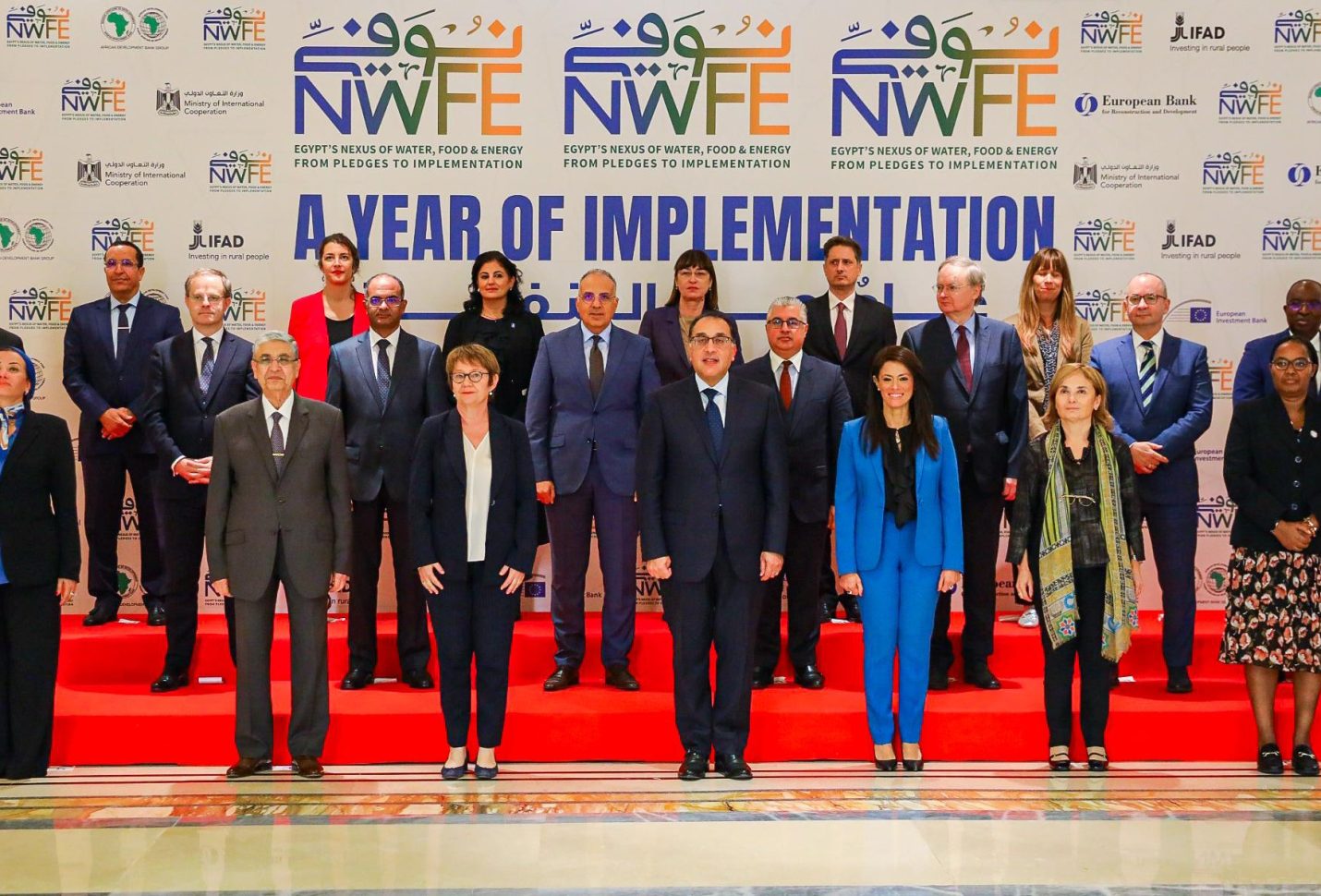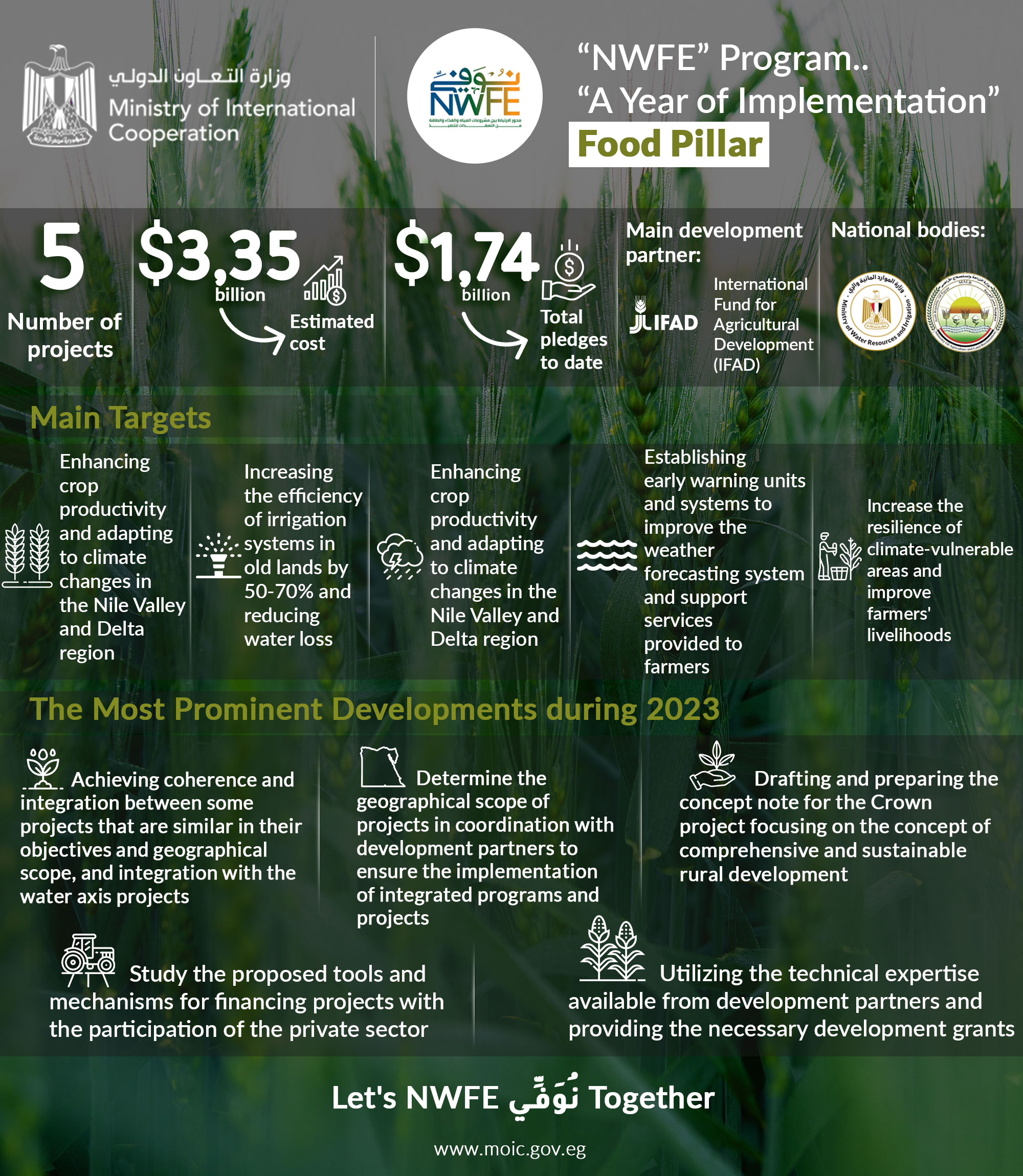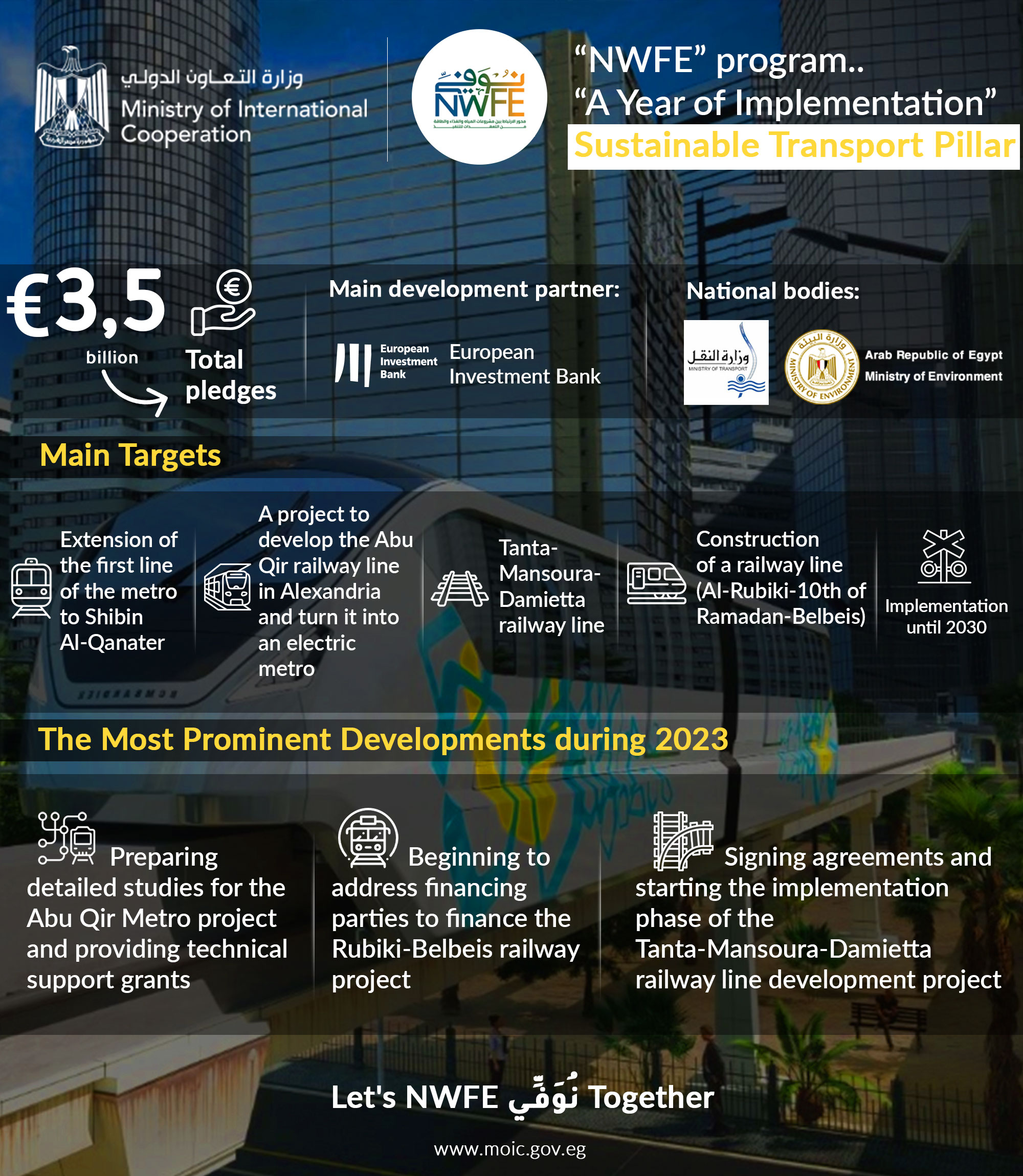
Water Conservation: 7 Simple Ways to Save Water at Home and in Your Business
Water is one of our most precious resources, yet it is often wasted without thought. ...

The First Progress Report on the NWFE Program – issued by the Ministry of International Cooperation on the occasion of the one-year anniversary of the launch of the program – said that over $ 8.5 billion financial pledges was allocated to food, energy and sustainable transportation projects.
Pledges from development partners decided to provide $1.7 billion in innovative financing tools to implement 5 projects in the food pillar, while financial pledges for sustainable transportation projects stood at €3.5 billion.
About $3.2 billion financial pledges were earmarked from development partners to implement the components of the program’s energy pillar.
The high level roundtable event featured the highlights of the NWFE program – the nexus between water, food and energy projects- as well as the “NWFE+” program for sustainable transport projects.
 Energy:
Energy:The report revealed that throughout the year coordination was made with the relevant national authorities, especially the Ministry of Electricity and Renewable Energy, the main development partner, the European Bank for Reconstruction and Development (EBRD), and other partners from international institutions, the private sector, and international alliances, in order to put projects into practice with the aim of enhancing objectives of mitigating the repercussions of climate change. This was achieved by reducing harmful gas emissions, improving air quality and ensuring access to reliable and clean energy sources, while achieving national climate goals, in the implementation of the directives of the political leadership.
Minister of International Cooperation Dr. Rania A. Al-Mashat said that cooperation efforts with development partners, especially within the framework of NWFE, are based on three basic principles; first, the Egyptian government’s commitment to moving forward with climate action efforts and transitioning to a green economy. Second, clarity; complete information is available about each project, its purpose, and the required feasibility studies. Third, credibility; the state works to achieve its goals and work, strengthen international partnerships, and take into account governance standards and their differences between each development partner. This contributed to reaching new financing mechanisms and sources for the first time and benefiting from them. An example of such is the High Impact Partnership on Climate Action (HIPCA), managed by the EBRD, and the Transformative Carbon Assets Facility (TCAF) managed by the WBG.
The president of EBRD, Odile Renaud-Basso, said, “When the Bank took the lead on the energy pillar of NWFE, we had a clear goal; to accelerate Egypt’s energy transition. A year later, we are proud to see the tangible results we have achieved for this program, explaining that the operational results achieved during that period make the energy hub within the NWFE program-an example of a successful national platform.”
Renaud-Basso explained, “This is due to the joint effort with development partners, and through cooperation with all partners, the Bank has mobilized $1.5 billion in the form of soft development financing, grants, and other forms of financing that enhance investment in the energy network in Egypt. These funds work to mobilize billions of private investments in the field of renewable energy. Indeed, projects with a capacity of 1.8 GWS have begun, which attracted about $1.9 billion in private investments. Egypt also signed the first debt swap for network-strengthening investments.
In the same context, the Head of the European Union Delegation to Egypt, Christian Berger, said that the EU supports the NWFE program- an essential element in Egypt’s strategy for climate change and a necessity for achieving sustainable development. He explained that the program helps Egypt develop aspects of integration and interconnectedness between water and agricultural projects-an essential element of Egypt’s climate strategy and necessary to achieve sustainable development.
Berger added, “The EU welcomes Egypt’s efforts to institutionalize the NWFE program and enhance investments from the government and private sectors.”
The Ministry of International Cooperation’s statement said that since COP27 in Egypt’s Sharm El-Sheikh last November, the total pledges from multilateral and bilateral development partners and international institutions, in the form of concessional development financing, development grants, debt swaps, and private sector investments, amounted to about $3.2billion dollars, from development partners -the EBRD, the European Investment Bank (EIB), the Netherlands, the EU, Denmark, the United States of America, France, the United Kingdom, the HIPCA Fund, and the TCAF Fund, in addition to technical assistance for the rehabilitation and the preparation of feasibility studies as well as maximizing partnerships aimed at implementing projects.
The ministry added that the political declaration issued in partnership between Egypt, the US, and Germany was issued by updating the Nationally Determined Contributions (NDCs) and moving forward the date for increasing the percentage of renewable energy in the energy mix to 42% by 2030 instead of 2035. This contributed to the completion of the debt swap agreement for climate action with the German side, worth €54 million, to support investments in the electricity transmission network, linking two wind energy projects with a capacity of 500 megawatts; the wind farm in Neuss and the Amunet wind farm in the Red Sea to the national transmission network. Work is currently underway to sign the second tranche of the debt swap with Germany for the program worth €50 million.
The ministry also confirmed that the private sector is a major partner in implementing the NWFE program projects, especially in the energy pillar, in furtherance of the state’s vision and its efforts since 2014 to enhance the private sector’s participation in energy projects.
In this regard, contracts have been made for renewable energy projects at a capacity of 3.7 GWs between the Ministry of Electricity and Renewable Energy and private sector companies such as ACWA Power, Masdar, Al Nowais, Orascom, and others.
The energy pillar aims to shut down 12 thermal power plants with a capacity of 5 GWs, and stimulate investments worth $10 billion to launch renewable energy projects with a capacity of 10 GWs during the period from 2023 to 2028, in close partnership with the local and foreign private sector.
During COP27, the partnership agreement on the energy pillar was signed with the EBRD, the EIB, the French Development Agency (AFD), the African Development Bank (AfDB), the Asian Infrastructure Investment Bank (AIIB), the United Kingdom, Denmark, and the Netherlands.
The ministry explained that the energy pillar projects enhance the achievement of the goals of Egypt’s Climate Change Strategy to reach sustainable economic growth, implement NDCs, and reduce approximately 17 million tons of carbon dioxide emissions annually that is a result from the closure of stations that operate on thermal energy and replace it with renewable energy plants; saving $1.2 billion annually that was to be spent on providing the fuel necessary to operate these plants.
The ministry added that a number of development grants were agreed upon from development partners, including HIPCA and TCAF, provided through the World Bank.
 Food Security:
Food Security:The report said that the food pillar includes 5 projects with investments of about $3.35 billion, while the total pledges from multilateral and bilateral development partners have so far amounted to about $1.74 billion, through cooperation with the IsDB, the Asian Infrastructure Investment Bank (AIIB), The European Investment Bank (EIB), the French Development Agency (AFD), and the International Fund for Agricultural Development (IFAD), and the projects are implemented in close coordination with the relevant national authorities represented in the Ministry of Agriculture and Land Reclamation and the Ministry of Water Resources and Irrigation.
The five projects are “Adaptation of Crop Production in the Nile Valley and Delta”, “Adaptation of the Northern Delta Affected by Sea Level Rise”, “Enhancing Resilience in Vulnerable Areas”, “Modernizing Irrigation System in Old Agricultural Lands” and “Establish an Early Warning System”
The report said that over the course of a year, the program worked to mobilize international and national efforts to formulate an innovative financing framework for the implementation of food pillar projects in the agricultural and irrigation sectors, so that it is based on stimulating the participation of the private sector in implementing green development projects, and enhancing its involvement in climate action and its contribution to financing and implementing strategies and projects to mitigate climate change and adapt to its effects, to increase agricultural productivity, enhance sustainability, enhance food security, and reduce the burdens on the state and the Egyptian government.
Food projects have an impact on millions of citizens in the target, as the“Adaptation of Crop Production in the Nile Valley and Delta” works to enhance crop productivity and their adaptation to climate changes in the Nile Valley and Delta region, and to support the capabilities of small farmers to adapt to the risks and repercussions of climate change, and it is expected that about 30 million citizens of the Nile Valley and Delta will benefit from it. It also contributes to increasing crop productivity by 10-15% and increasing income by 10-20%.
 Sustainable Transportation:
Sustainable Transportation:The “NWFE+” program for sustainable transport projects includes a number of sustainable transport projects, namely the project to extend the first line of the metro to Shibin al-Qanater, where the first line extends from Marj to Helwan and transports about 2.5 million passengers daily. The length of the extension is about 19.5 km to connect the governorates of Cairo (Marg) and Qalyubia (Shebin).
Additionally, there is also the project to develop the Abu Qir railway line in Alexandria and convert it into an electric metro (Alexandria Metro), which extends over a distance of 22Km and includes 20 stations to connect downtown Alexandria to the city of Abu Qir.
Thirdly, the project to construct the railway line (Al-Rubiki – 10th of Ramadan – Belbeis), which aims to establish the 10th of Ramadan/Belbeis railway line with a length of 60 km to connect the dry port on the 10th of Ramadan with the railway network.
Fourthly, the Tanta-Mansoura-Damietta railway line project. These projects are scheduled to be implemented by 2030.
The report explained that a partnership agreement was signed between the Ministry of International Cooperation, the Ministry of Environment, the Ministry of Transport, the European Investment Bank (EIB), the European Bank for Reconstruction and Development (EBRD), and the French Development Agency (AFD), where the three financing bodies pledged financing contributions amounting to €3.5 billion in the form of soft development financing, with €1.5 billion from the EIB, €1.5 billion from the EBRD, and €500 million from the AFD to implement sustainable transport projects within the NWFE+ program.
This is in addition to the EBRD coordinating to provide technical support grants to prepare the necessary studies for projects, and providing technical and investment grants from the EU.
The EIB is the main development partner for the sustainable transport pillar, given its international and local experience in implementing transport infrastructure projects, as Egypt is the bank’s first country of operations in the region since the start of cooperation in 1979. The choice of the bank also comes In light of its adoption of the 2021-2025 climate roadmap, it has effectively transformed into the EU Climate Bank.
The Vice President of the EIB, Gelsomina Vigliotti said, “The NWFE program brings together partners from Egypt and international partners to accelerate priority investments and achieve the green transformation, and our meeting today supports the program’s success in addressing investment challenges.”
Vigliotti added, “The EIB supports the NWFE program to promote new investments that improve the lives of millions of Egyptians and build on our long journey with Egypt, during which €15 billion were saved invested in the sectors of energy, transportation, food security, climate action, and investment all around Egypt over the past four decades. Our technical and financial contribution to the NWFE program will be further strengthened through the new regional headquarters of the EIB in Cairo.”
اترك تعليقا